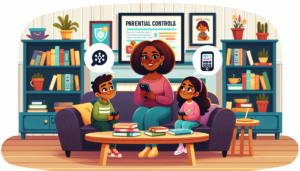| Key Takeaways | Description |
|---|---|
| Critical Thinking | Encourage kids to think critically about the content they see on social media. |
| Real-world Engagement | Promote activities that foster real-world interactions and relationships. |
| Online Etiquette | Teach the importance of respectful and authentic communication online. |
| Digital Breaks | Integrate regular breaks from social media to help maintain a balance with offline life. |
| Privacy Education | Educate on privacy settings and the importance of protecting personal information. |
| Positive Content | Encourage the creation and sharing of positive content that adds value. |
Instagram, YouTube, Snapchat, Facebook, Twitter . . . the list of social media platforms goes on and on, but all of these platforms have one thing in common: they are not reality. Images can be doctored, news stories can be twisted, and fake profiles can reinvent a person’s identity in seconds.
Still, these platforms have an undeniable hold on teenagers’ attention. Statistics show that 90% of teenagers have used social media and 51% of teens use social media daily. Social media is the go-to place for teenagers to talk to friends, get news, and find entertainment.
If your children are among the millions of teens who scroll through their social media feed daily, how can you make sure they are having positive experiences? Keep reading to learn three ways you can help your children find the good in social media while keeping themselves grounded in the real world.
Keep Profiles Private
Many parents teach their children about “stranger danger”—never engaging with a person they don’t know unless a parent is nearby. This obviously applies to people your children meet in person, but what about the people they meet online? Do your children have the same level of alertness about strangers on social media?
Log on to each social platform with your children and show them how to keep their profile private. This means your children can still interact with their friends online, but strangers will not be able to access their personal information. Also teach your children to never accept friend requests from people they don’t know in real life. Predators often use seemingly innocent profiles to gain access to children.
Think Before You Post
Social media is a lot like the Wild West. There are few rules about what goes on and few people policing the platforms. Teens can post almost anything they want! This can be an exciting opportunity, but it can also be dangerous. Most teens are unaware that what they post on the internet lives on forever, even if they delete it. What they post when they are immature 13-year-old children may come back to haunt them when they are 18-year-old adults applying for college.
Teach your children to never post anything that they wouldn’t say out in public in real life. This includes anything that is hurtful or unkind, no matter how minor it might seem. They should also never post photos of themselves or any other person in any state of undress. If they aren’t 100% sure that a post follows these guidelines, they shouldn’t post it.
Make Mental Health a Priority
Many children’s health professionals worry about the impact social media is having on the mental health of young people. A survey from the Pew Research Center showed that nearly one-quarter of teens feel that social media has a negative impact on their lives. In one specific example, teen girls posting selfies has been associated with lower self-esteem, decreased life satisfaction, and feelings of insecurity. This trend is so prevalent that the term “Snapchat dysmorphia” has been coined by medical professionals. It’s used to describe people who want to make their real-life appearance match how they look in a selfie filter.
Teens may become anxious, jealous, or depressed when using social media. Often, teens will monitor how many likes or views a post gets and be disappointed if it falls below their expectations. Teens also commonly compare themselves to their friends or celebrities on social media, not realizing that what people post isn’t an adequate representation of their real lives. This can lead to jealousy and depression.
Be mindful of social media’s mental health impact, and watch for any emotional changes in your teenagers. Teach your children to really think about how social media makes them feel. Let them know that it’s okay to take a break if they find themselves feeling bad.
It’s also a good idea to take steps to help your teenagers build self-esteem offline. Encourage them to pick up a new hobby or start playing a new sport. Compliment them often on their hard work and the talents they have. This kind of reinforcement will help them to combat the negative aspects of social media.
Resources
American Academy of Child and Adolescent Psychiatry. (2018 March). Social Media and Teens. https://www.aacap.org/AACAP/Families_and_Youth/Facts_for_Families/FFF-Guide/Social-Media-and-Teens-100.aspx
Anderson, M., Jiang, J. (2018, May 31) Teens, Social Media & Technology 2018. https://www.pewresearch.org/internet/2018/05/31/teens-social-media-technology-2018/
Ehmke, R. (n.d.) How Using Social Media Affects Teenagers. Child Mind Institute. https://childmind.org/article/how-using-social-media-affects-teenagers/
Ehmke, R. (n.d.) What Selfies Are Doing to Self-Esteem. Child Mind Institute. https://childmind.org/article/what-selfies-are-doing-to-girls-self-esteem/
Innocent Lives Foundation. (n.d.) How Predators Have Infiltrated Social Media. https://www.innocentlivesfoundation.org/how-predators-have-infiltrated-social-media/
Natanson, H. (2017, June 5) Harvard Rescinds Acceptances for At Least Ten Students for Obscene Memes. The Harvard Crimson. https://www.thecrimson.com/article/2017/6/5/2021-offers-rescinded-memes/





